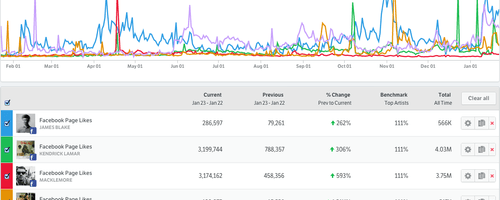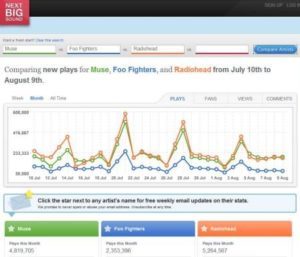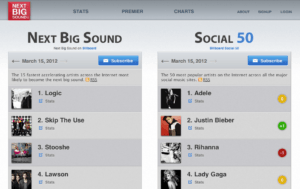Next Big Sound – moneyball for music?

How one company is using data analytics to predict music’s next superstars
Introduction
Alex White, now CEO of Next Big Sound, spent his freshman year summer internship at Motown records stapling weekly CD sales. Looking at these numbers, he began pondering the reasons why some artists become uber-successful while others fizzled. Once he returned to Northwestern University, he enlisted the help of two friends to build a company dedicated to disentangling the black box of an artist’s trajectory [1].
Now Next Big Sound is doing just that – using big data to help make sense of the chaotic-seeming and hit-driven music industry. The company analyzes everything from Spotify streams, YouTube hits, and iTunes sales to Facebook likes, Wikipedia page views, and Twitter mentions to predict album sales with astonishing accuracy – the company claims its forecasts are accurate to within a 20 percent margin of error for 85 percent of artists [1].
Value Creation
No longer solely reliant on the executives and their so-called “golden ears”, record labels are flocking to the service [2]. As a result, other competitors using predictive analytics to determine future success of a particular song or album, like Music X-Ray and The Echo Nest, are entering the space.
Next Big Sound differentiates itself from competitors by going one step further in its analysis. The company not only predicts hits, but also tracks the effects that radio plays, talk show appearances and other events have on an artist’s performance (in terms of sales and video views) [3]. Also, Next Big Sound’s software helps musicians connect with fans by analyzing metrics across Facebook, Twitter and YouTube and suggesting ways in which talent can use these platforms to increase fan connection and airplay [3]. Finally, Next Big Sound’s database is particularly useful when artists select singles—utilizing statistics from previous albums to learn what kinds of songs performed best over time.
As sponsorships have become an increasingly important revenue stream for artists, Next Big Sound has begun to tailor its product offering to large brands like Pepsi, American Express and Absolut [3]. By determining which artists are likely to blow up in the next six months or what music attracts a certain demographic, Next Big Sound can help brands spend marketing dollars more effectively.
Value Capture
Next Big Sound captures customers throughout the value chain – from record labels and Fortune 500 companies to individual artists. The company charges an annual subscription fee, which varies based on service level. Individual artists wanting to better understand their relative performance on Spotify and other streaming services can access more basic services (with pricing starting at $20 / month) [4].
Future Growth and Challenges
Next Big Sound’s algorithm has been so successful (predicting the 2014 Billboard top 200 with 80% accuracy) that Billboard now even publishes two charts dedicated to the company’s up and coming artists [6]. Skeptics wonder whether these predictions have reached a point of self-fulfilling prophecies – is the company predicting hits or actually creating them?
Brand partnerships are one major area of growth the company envisions. Next Big Sound has just begun to collaborate with large corporations to help steer the $1 billion plus that is being spent each year by brands on music-related marketing and sponsorships [2]. Eventually, the company expects go beyond corporate marketing and provide a similar service for TV shows, video games, movies, etc.
Furthermore, Next Big Sound hopes to expand its predictive capabilities to fields outside of music. The company launched Next Big Book in May 2014 to bring their expertise to the similarly complex book publishing industry. Finally, the company won patent approval for their “likelihood of success” algorithm which analyzes popularity across a variety of metrics.
[1] http://www.inc.com/jeff-bercovici/2015-30-under-30-next-big-sound.html
[2] https://www.fastcompany.com/3039593/most-innovative-companies-2015/next-big-sound
[3] http://observer.com/2017/01/pandora-next-big-sound-moneyball-music/
[4] http://passivepromotion.com/what-artists-should-know-about-next-big-sound






Daniella – this is an awesome find. It makes complete sense that like baseball, the music industry and its subjectivity for selecting talent can be “disrupted” with data. One thing I wonder is the level of subjectivity that comes with promoting and pushing that talent to the top. Unlike baseball – in which once players are on the field it is relatively meritocratic to value them based on performance – a lot of times in the music industry shows and albums are sold out based on marketing and promotion done by the labels. I would be curious to know how that, coupled with an overhaul of the music label industry in general (Chance the Rapper, for example), changes whether or not being data-driven in talent selection even matters.
Really interesting post! I definitely have the same question as the skeptics you’ve mentioned – given the subjectivity of music, I wonder if the predictions become somewhat of a self-fulfilling prophecy; after all, this is an industry where success often begets more success. Buzz and hype do matter. Taking that skepticism one step further, I wonder if artists could reverse-engineer the rankings metrics and artificially prop up their rankings based on juicing certain metrics, like social media call-outs. Given the fluffiness of some of their metrics (social media metrics can certainly be manipulated), I question if artists can work the system to their advantage.
I’m really intrigued by this application to music. In such a hits-driven industry, having the ability to predict what artists and tracks are about to blow up could be worth gold. I’d be curious to know how their predictive power compares for artists signed to major labels vs. the unsigned. Traditionally, the majors have spent so much on marketing their artists that they already had a pretty good sense of where sales will come from. In today’s fragmented online world, however, there’s many hits emerging from the broader creative community. If they are able to predict what will be hot there too, then they could be very well positioned to start their own label and represent unsigned stars-to-be.
Love Next Big Sound! Great post. I have two questions/musings…
1) It’s interesting to me that they’re entering into the book publishing industry. I’d heard of Next Big Sound when they were first getting started, and I was under the impression that the founders were music geeks. This would lead me to believe the company’s core competencies are around music sector expertise / networks as opposed to data analytics capabilities. Do you have a sense for what their core strengths are as a company and whether you think those strengths will transfer to the world of books?
2) I believe they got acquired by Pandora in 2015? Did your research reveal any intel on how Pandora planned to integrate products / share data across the two products?
Hi Daniella! Very interesting post. Certainly, Next Big Sound has gained a lot of clout with the Billboard Top Hits. Part of the company’s success comes from all the data and analytics it gathers across multiple sources. However, I’m wondering to what effect Pandora’s acquisition of Next Big Sound in 2015 has had on the company. Has Next Big Sound been able to maintain the same level of independency from Pandora? I would imagine, with access to Pandora’s database, Next Big Sound is able to tap into much more information. How has Next Big Sound leveraged its closeness with Pandora? Have the algorithms gotten better (for instance, was there a noticeable improvement in Next Big Sound’s ability to predict the next Top Hits in 2016 compared to 2014)?
More generally, how has Next Big Sound changed due to it being acquired by Pandora?
Great post.
Any information available on the variables that are most explanatory for their rankings? They site pulling information from a lot of sources, but the circularity of the music industry (particularly in driving hit singles) makes me question the ability to drive investment to discover and promote new artists versus piggyback on artists who have already achieved a fairly significant level of success.
In other words, does this service help a musician go from aspiring cafe performer in Nashville to opening for Carrie Underwood, or from opening for Carrie Underwood to playing your own headliner tour?
Daniella, loved your post! Really interesting company. I am curious about the purported accuracy of the service – 20% margin of error seems pretty high to me; do they provide any statistics of what their competitors (or traditional A&R employees at record labels) are able to predict? Would be any interesting comparison given the difficulty of identifying the next big hit. My other major question is related to competitive response – what is stopping a large, more-well funded competitor (e.g. Spotify) from doing this themselves? I believe that Spotify already has a tool for artists to analyze their streaming data to identify trends and see which types of listeners are connecting with their music. Do you think Next Big Sound would be acquired by a larger competitor in the longer-term?
Awesome post – thank you for sharing! Really interesting to hear about how they expanded beyond just record labels to help brands find the right artists for their upcoming advertising spends. However, I am a little weary of the use of data in predicting success in creative industries. As it is based on historical data, the model might not know how to respond to a “new sound” and thus reject it, yet these completely original sounds have the potential to be the biggest blockbusters!
Extremely interesting post! Really makes you wonder after the prediction capabilities get very good if you could essentially use the characteristics of “hits” to write a song from scratch. I also wonder if this could eventually be extended to movies and tv shows as well.
Thanks for the interesting post, Daniella! I wonder what will happen over time if using Next Big Sound or a similar analytics solution becomes standard practice for all artists, record labels, and advertisers. Will this stifle creativity, and lead to a sort of convergence of styles as everyone tries to tailor their music to be the next big hit?
Great post Daniella! It’s awesome to see data being applied to creative fields like music. Next Big Sound scans the internet looking for data points to evaluate and analyze the success a certain artist / music. But this approach assumes that the artist / soundtrack is already out there in order to be able to measure people’s early reaction to it. I wonder wether in the future, there is an opportunity to intrinsically assess the success / quality of a given piece of art without it even being released to people – using some sort of Alex’s machine learning black box :). This would allow artists who don’t have access to effective distribution to gain recognition and bypass labels. Or may be this AI could even be used to produce high quality art without the need for a human artist…